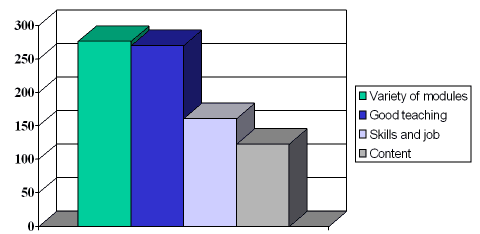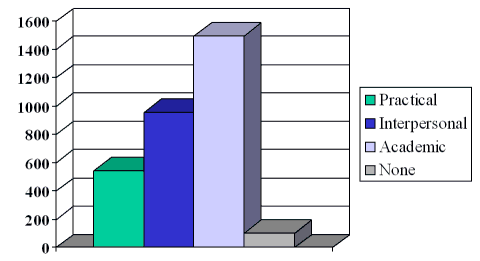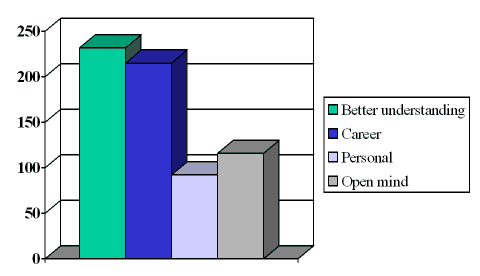Three questions in our 2006 student survey addressed questions of employability: we asked students what they saw as the best aspects of their degree, what useful skills they had developed, and how they had been changed by the course.
The Full Report is downloadable as a PDF file (Warning: large download).
Q14. Please identify the best one or two aspects of your degree course and say why
Figure 1. Coded responses to Question 14

All respondents answered this question. Among the most frequently mentioned best aspects of courses are quality of staff and lecturers, variety of modules to study, future job prospects and course content. Answers are very similar to the ones given in the 2004 students' survey.
Possible use of knowledge from the variety of modules in preparation for future careers and job opportunities is considered by many to be one of the best aspect of courses: "The diversity of future career opportunities."; "The best aspect has been the variety of modules on offer, as they have enabled me to gain a good pool of skills for future job."; "Learning material which is relevant to my future career. This gives me an insight into the application of theory."; "Development of critical thinking ability, because this is very useful in the real workplace."; "Economics is highly respected by employers."
Q24. What skills have you developed by studying for your degree that you feel will be useful to you in your career after you have graduated?
All the respondents answered this question and mention at least two types of skills that they developed during their degree course. There are a wide variety of skills that the students have developed. These skills can be subdivided into three broad categories: Interpersonal, Academic and Practical.
Interpersonal skills include enhanced communication skills and group work skills. Students also report that they have acquired time-management, self-study, multi-tasking and organisational skills, which they think will be useful in the future.
Students also report on having developed the academic skills that are related to their study: knowledge and understanding of specific subjects as well as analytical and critical thinking. Essay writing skills, research and study skills are also mentioned as important by students. Numerical skills are mentioned in terms of allowing the application of knowledge in the real world.
Figure 2. Coded responses to question 24

Students also stress the practical skills gained during their course. They include: decision-making, knowledge of the business world and discursive skills. Students consider the mastering of a specific software use and mathematical techniques as very relevant skills. Some students stress that studying on this degree has increased their self-confidence and motivation as well as help their language skills.
Only about 5.0% of respondents reply that during their degree course they haven't developed any additional skills.
Q28. How has the course changed you?
Figure 3. Coded responses to question 28

More than half of respondents answered this question. There are both positive and negative comments to this question.
On the positive side, the students mention that the course gave them the clear career direction, a "more positive outlook on my future career path." The course strengthened the career aspirations for some students and enhanced their understanding of life in general, gave insight into the "Economics issues in the world" and clarified "how the business world works".
The course increased awareness about how economy of the country works, allowing them to understand the decisions of the government - "It has made me consider the economic implications of actions taken by people. For example government policy and my views on issues such as international trade." This allows students to have a "well-informed opinion" on different Economics-related issues. The students also understand the importance of Economics and its effect on the society. "Made me realise that the economy is far more complex than first thought but has enhanced my view on a career in finance."; "For the better. I look at everything in the world, and think Economics. It changes the way you think, into a more rigorous analytical mindset."; "It has helped me understand more the reasons for economic problems facing the world, and has given me more knowledge which are very valuable in life."
Students mention the changes to their skill sets: the course taught them to work hard, to be determined in reaching their goals, be independent learners, as well as developing critical skills, thoughtfulness and improved problem-solving abilities: "My knowledge of the world has been enriched, career choice - previously was very pro a big multinational firm - now not so inclined to that career choice, perceptions of the world - realised there is a lot more to it than just western ideas etc."
The course encourages students to follow chosen career paths: "The course itself hasn't changed me as a person much, but it has broadened my horizons and helped me realise what I want to specialise in, where there's room for more research."
Many students stress that their degree course taught them not just Economics but show the whole complexity of issues: "It showed me that through Economics one can learn a lot about psychology, behaviour, sociology and philosophy as well - I started to think more in these terms as well and not just concentrate rigidly on the economic side of the issues."; "I think about things differently. Thinking of life in an occasionally amoral way, and in terms of opportunity cost (for example) changes perspective."; "I have developed the attention for the a bigger picture when it comes to issues of the world. Economics turned out to help me understand how the world works in fields of politics, sociology, world Economics, business and even psychology."
The Full Report is downloadable as a PDF file (Warning: large download).
↑ Top
